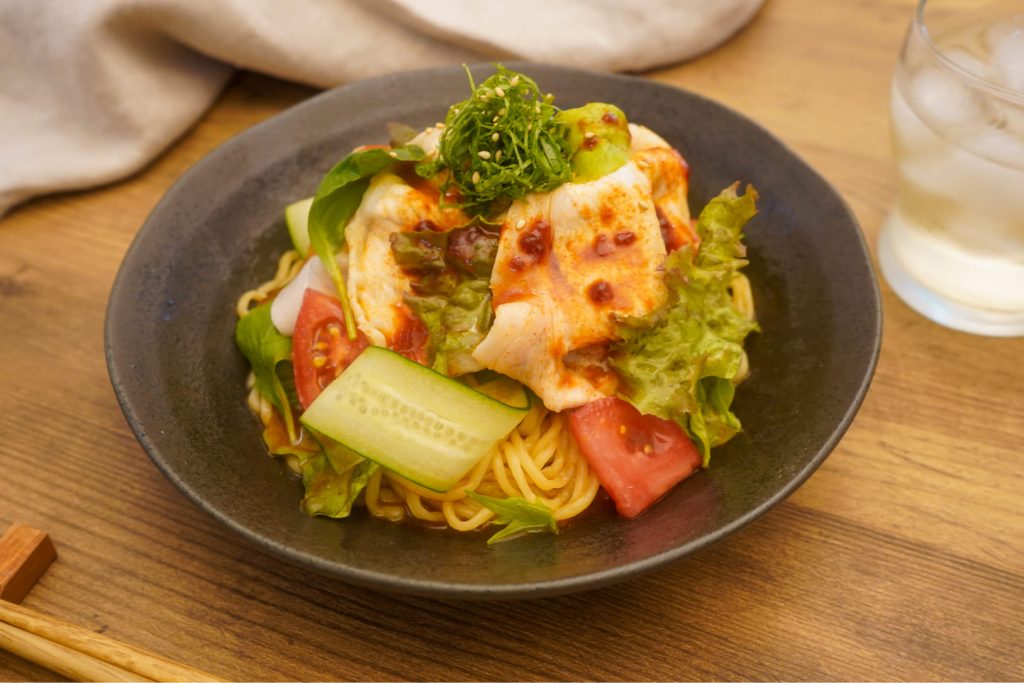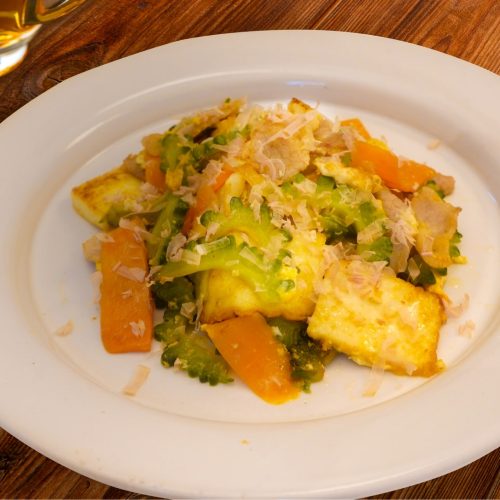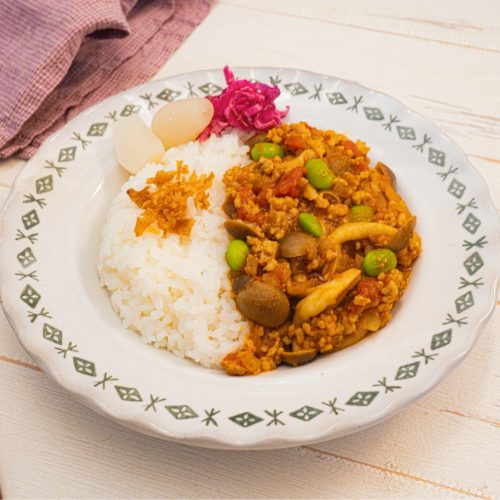Spicy Pork and Summer Vegetable “Mazemen”.
Seasonal recipes to enjoy summer vegetables and "Yume no Daichi"
In the eighth installment of "Seasonal Recipes" using "Yume no Daichi" and seasonal ingredients, we introduce a dish using cucumber, a vegetable that is in season from July to November.
This time, we will introduce a spicy mazemen noodles dish perfect for summer, with the addictive spiciness of Sichuan-style raayu (Chinese chili oil).
The well-cooled, firm Chinese noodles and
tender pork shabu-shabu are intertwined with the spicy sauce,
The spicy sauce is a delicious combination that will leave you wanting more.
Please enjoy it with fresh summer vegetables such as cucumbers and tomatoes.

INGREDIENTS-SERVES 2
- Chinese noodles (for chilled noodles): 2 bags
- Pork loin: 200g
- Sunny lettuce: 2 leaves
- Baby leaf: as needed
- cucumber: 1/4
- Tomatoes: 1/4
- Shiso: 6 leaves
- White roasted sesame seeds: a pinch
SEASONING
- Men-tsuyu (3 times concentrated): 3 tablespoons
- Water: 4 tablespoons
- Gochujang (red pepper paste): 1 tablespoon
- Raayu (Szechuan style): 1/2 tablespoon
- Sesame oil: 1/2 tablespoon
PROCEDURE
- Combine seasonings in a bowl and mix well.
- Tear sunny lettuce into bite-size pieces. Slice cucumber with a slicer. Cut tomatoes into bite-size pieces.
- Cut shiso leaves into strips, soak in water, and drain.
- Bring a pot of water to a boil, reduce the heat to low, and quickly boil the pork loin one by one until cooked through. Drain in cold water.
- Boil water in a pot and cook Chinese noodles for the indicated time. Drain in iced water.
- Place Chinese noodles, sunny lettuce, cucumber, baby leaves, and tomatoes in a bowl, in that order.
- Pour the sauce from 1) and garnish with shiso leaves and white roasted sesame seeds.
Point
- After boiling pork, it should be soaked in water at room temperature. Note that if the pork is soaked in ice water or other water with a lower temperature, the fat will harden and the texture will deteriorate.
Cucumber is one of the most popular summer vegetables.
Cucumbers are so low in calories (14 kcal per 100 g)*1 that they are listed in the Guinness World Records as the “Least caloric fruit” (the fruit with the fewest calories).
At first glance, you may think it has no nutritional value, but in fact, it is packed with nutrients such as potassium, vitamin C, and dietary fiber.
Potassium has a diuretic effect and is said to be effective in eliminating sodium from the body and reducing swelling, and it also has the effect of cooling the body by expelling heat trapped in the body.
When potassium is deficient, fatigue tends to accumulate in the muscles and appetite is reduced. This is what is called summer fatigue.
This summer, let’s eat nutritious cucumbers and “Yume no Daichi” together to prevent summer fatigue and get through the summer.
*1 From the Standard Tables of Food Composition in Japan, 2020 edition (8th revision)
Editor

HOSONO Sayaka
Food coordinator
She has appeared on cooking shows, produced and filmed recipes for cooking video services, and written and taught cooking articles.She specializes in creating home cooking recipes that are easy to imitate and simple.
In 2017, she moved to Singapore to develop and sell bento recipes. Since then, he has been working to promote Japanese cuisine both domestically and internationally.
Editor

MAKITA Yoshimi
Registered Dietitian
She has experience in product development and specific health guidance for a food service company.
In addition to her extensive field experience as a registered dietitian, she is involved in column writing and nutritional calculations.
She specializes in creating menus for people with health issues.
Recommend post
-

EXPERIENCE HOKKAIDO
Hakodate Christmas FatasyHakodate Bay Area, red brick warehouses and giant tree
-

EXPERIENCE HOKKAIDO
Soft candle light illuminates Otaru in winter-Experience volunteer staff at “Otaru Yukiakari no Michi”
-

RECIPE
Goya champloo with deep-fried tofuSeasonal recipes to enjoy
early summer vegetables and
"Yume no Daichi" -

RECIPE
Pork Keema Curry with Edamame.Seasonal recipes to enjoy
early summer vegetables and
"Yume no Daichi" -

NEWS
We won the “Sustainability Award” at Royal Holdings’ “Supply Awards 2025”!
-

INTERVIEW
I want to change the agricultural industry.-The relationship between new forms of agriculture and "Yume no Daichi"
